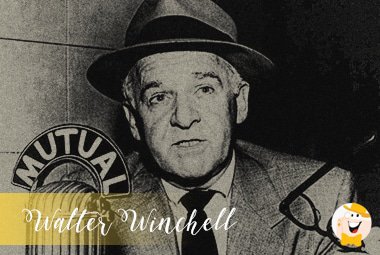
The year was 1967. I was working as a reporter on a weekly newspaper in Phoenix, AZ. when I received a call from my friend and former editor Dave Molina. He was in Los Angeles working as a copy editor for the Herald-Examiner.
'Want a job on a real newspaper,' were his opening words. 'There's an opening here and if you move fast you can have it.'
He gave me the name of the Herald-Examiner's managing editor. I called him, we had a lengthy conversation, and he hired me over the phone. That was how I went to work as a general assignment reporter for the Los Angeles Herald-Examiner, home of the ink-stained wretches of the fourth estate.
A week later I entered the antiquated building at 1111 S. Broadway that housed the Hearst newspaper. As I walked up the creaky stairwell to the fourth floor where the editorial offices were located, I passed Walter Winchell, the Her-Ex's syndicated Hollywood columnist. He was talking with another Herald-Examiner reporter James Bacon, who had written a best-selling book, 'Hollywood Is A Four-Letter Town.'
'Wow,' I thought. 'I'm with the big boys.'

It didn't take long for me to discover that nearly all of the Herald-Examiner's editorial staff members were drinkers. City Editor Tom Caton, sports writer Al Stump, rewrite reporter Walt Egger, all of them were proud of their ability to drink. Molina and I tried to fit in with their lifestyle.
Every two weeks we cashed our checks at Corky's Bar and Grill, a favorite hangout of the Her-Ex staff. Stump was a successful freelance magazine writer who had published articles in Esquire and True. He had even written a couple of books on baseball legend Ty Cobb.
When I found out about that, I told Stump my Uncle Ott had watched Cobb play baseball.
'He said Cobb would sit in the dugout and use a file to sharpen the spikes on his shoes,' I told Stump.
He nodded. 'He was a mean S.O.B.,' Stump said.
Cobb, a native of Georgia, was a hard drinker and gambler. He was also notoriously cheap. After he hired Stump to ghostwrite his autobiography, 'My Life In Baseball,' they began meeting at his mansion for the interviews.
There was only one problem. It was winter and the place had no electricity. Cobb was involved in a battle with the power company over a bill and the company had turned the electricity off.
'We sat at the table in overcoats shivering while I conducted the interviews,' he said. 'Cobb was unbelievably stubborn when it came to money.'
Cobb was not doing well physically when Doubleday Publishing Co. advanced him $6,000 to write the book. He split the fee with Stump. After the book was published, he died a short time later at the age of 74.
'He would call me up at all hours of the night and ask me to drive him to a casino,' Stump recalled. 'He loved to drink and gamble. Cobb was a tough guy to deal with but I liked him and I'd haul myself out of bed to take him where he wanted to go.'
He said Cobb was very demanding on what he wanted in the book and maintained a tight editorial control on its contents. Stump added that he didn't feel the book reflected the true nature of the baseball player and after his death he wrote a follow-up book called 'Cobb' which was made into a movie.

The film only did about $1 million at the box office before the distributor took it out of the theaters.
I also became friends with James Bacon, a syndicated writer who covered Hollywood. In his book, 'Hollywood Is A Four-Letter Town,' he devoted a chapter to the night he made love to Marilyn Monroe.
She was staying in a cottage on the property of a well-known film producer. The man was in his 70s and Marilyn was his mistress, according to Stump.
'I went over to the cottage and was interviewing Marilyn for an article,' he said. 'We were drinking Dom Perignon champagne when things got romantic. I'll never forget that night.'
I stayed with the Herald-Examiner from 1967 to 1971, covering some big stories including the Charles Manson 'family' murders and trial; the 1969 Los Angeles earthquake; the return of the USS Pueblo crew; the Pentagon Papers; and many other events. It was the best newspaper I ever worked for and I will always be grateful to Molina for making that phone call.

0 comments:
Post a Comment